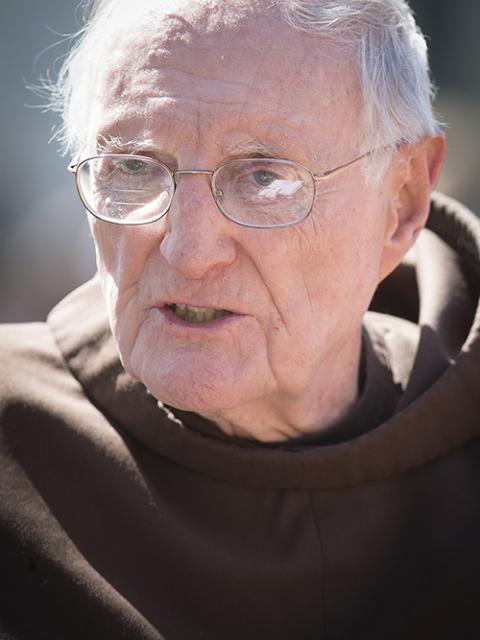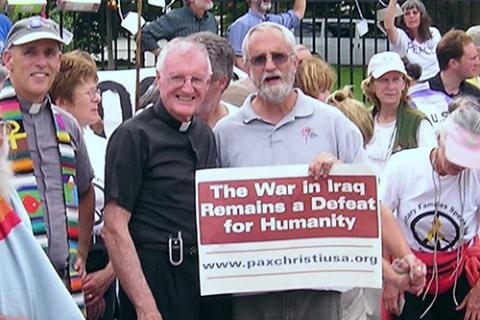
Franciscan Fr. Joseph Nangle, associate pastor of Our Lady Queen of Peace in Arlington, Va., speaks during a prayer service in front of the White House in Washington on Ash Wednesday, Feb. 22, 2012. (CNS/Peter Lockley)
Franciscan Fr. Joseph Nangle, who spent 15 years as a missionary in Latin America, returned to the U.S. in 1975 and then spent the next nearly 50 years challenging war, poverty and injustice, died Dec. 14 in Washington at the age of 92.
A professed Franciscan friar for 72 years and a priest for 66 years, Father Joe or simply Joe, as he was known, from Lexington, Massachusetts, embraced the Franciscan values of simple living, fraternity and care for the Earth in every facet of his life and he readily connected with others in conversation, said his friends and fellow justice advocates.
"You had the sense that you were in the presence of someone who looked at you almost in the sense of the Gospel stories, how Jesus looks at a person, that there's a real connection," said Scott Wright, an Ignatian Volunteer Corps member at Pax Christi USA's Washington headquarters.
Jean Stokan, Wright's wife and member of the Justice Team of the Mercy Sisters of the Americas, described Nangle as prophetic and pastoral in how he related to the people around him. "If there ever really was a Christ figure, it was Joe Nangle," she said.
Advertisement
For 49 years, Nangle regularly joined prayer vigils and peaceful public witnesses in the nation's capital to implore government policymakers to overturn practices that he believed harmed poor and marginalized people in the United States and worldwide.
One of his last public witnesses took place last Ash Wednesday in Lafayette Park across from the White House where he presided at an outdoor Mass calling for repentance of both personal and social sin.
"He was not afraid to mince words when he would preach," Stokan said. "It was just simply the Gospel. Jesus is always in conflict with the power structure."
Bishop John Stowe of Lexington, Kentucky, a conventual Franciscan, said he was inspired by Nangle when he worked with him at times on his order's Social Justice Commission.
He said Nangle was the "real deal" in how he approached his work for justice in the world.
"I think he's a conscience for most of us. To see him out there (working for justice) makes us question what we should be doing," Stowe told the National Catholic Reporter.

Franciscan Fr. Joseph Nangle, associate pastor of Our Lady Queen of Peace in Arlington, Va., is seen during a March 28, 2016, rally in Washington held near the White House to call on the Obama administration to put an end to the detention of immigrant families. (CNS/Tyler Orsburn)
Friends said his concern for the poor emerged while he was a missioner in Latin America from 1960 to 1975 ministering alongside poor indigenous communities, first in Bolivia and then in Lima, Peru.
In Peru, Nangle was influenced by the work of Dominican Fr. Gustavo Gutiérrez, one of the founders of liberation theology,which emphasizes addressing the needs of poor communities and political liberation for oppressed people.
"When he left Peru, he came back to change the United States of America," said longtime friend Marie Dennis, who along with the priest and others established the Assisi Community in October 1986 in Washington. The intentional faith-based group of laypeople and vowed religious, which continues today, focuses on simple lifestyle, prayer, social justice and witness.
Dennis, senior director of Pax Christi International's Catholic Nonviolence Initiative, described Nangle as her "dearest friend" and said he was "committed to his Franciscan vocation" as well as to the people of Latin America who showed him how to live in dignity despite the dire poverty they were experiencing.
"He was not afraid to speak truth to power. He saw the dignity of every person he met. He loved us all," Dennis said.
Nangle and Dennis met after he returned from Peru when he was hired at the parish she worked at in suburban McLean, Virginia, as the diocese was responding to the Second Vatican Council's call for parishes to be committed to social justice. "He became central to that parish," Dennis said.
"He was not afraid to speak truth to power. He saw the dignity of every person he met. He loved us all."
— Marie Dennis
After several years, the Franciscan took on another ministry, but the two stayed in touch, eventually leading to their collaboration on a variety of justice-themed programs and the eventual formation of the Assisi community.
Nangle held various positions addressing social justice concerns and missionary ministries beginning in the late 1970s including with the U.S. Conference of Catholic Bishops, the Conference of Major Superiors of Men, Sojourners magazine and the U.S. Catholic Mission Association. He also served for 12 years as codirector of the Franciscan Mission Service, a lay overseas mission program, and helped found the Franciscan Action Network, an advocacy organization.
Nangle was a member of the provincial council of the Holy Name province of the Order of Friars Minor — now the Province of Our Lady of Gudalupe in Atlanta — from 2011 to 2017.
A prolific author, he wrote Birth of a Church and Engaged Spirituality: The Life in the Heart of the Empire and co-authored Saint Francis and the Foolishness of God and Say to this Mountain. He also wrote a weekly reflection for Pax Christi USA in recent years.
Nangle was born July 20, 1932, to Mary and Joseph Nangle. He enrolled at St. Bonaventure University in western New York after his father died in 1949, graduating from the institution in 1951. He began thinking about a religious vocation when one of the Franciscan brothers at the school asked him if he "ever considered wearing the brown (Franciscan habit)," Dennis said.
Ordained a priest April 25, 1958, in Washington, he was assigned two years later as a missionary in Bolivia. In 1964, he was sent to Lima, Peru. While in Peru, the Second Episcopal Conference of Latin America, convened in 1968 in the wake of the Second Vatican Council. At the conference, the bishops charted a course focused on the poor and oppression in society.

Franciscan Fr. Joe Nangle and Tom Cordaro, a fellow Pax Christi USA Ambassador of Peace*, participate in an anti-war demonstration at the White House in Washington in September 2005. (CNS/Courtesy of Pax Christi USA)
His love of the Latino community led Nangle to join the staff of Our Lady of Queen of Peace Church in Arlington, Virginia, ministering to the parish's Spanish-speaking members. He presided at the weekly 1 p.m. Sunday Mass until this November.
"He had a huge impact at the 1 o'clock community in this parish. They really saw Joe as a grandfather figure, as a wisdom figure. He just exuded so much love and warmth. They felt cherished by him. They felt heard and seen," said Spiritan Fr. Tim Hickey, pastor.
"Joe's passing leaves a big hole," he said.
The priest's funeral Mass will be celebrated at the parish Dec. 21.
Recognizing Nangle's lifelong commitment to Gospel-based social justice ministry, Pax Christi USA named him its Teacher of Peace in 2023. He previously was recognized as an Ambassador of Peace by the organization.
But for fellow justice advocates, Nangle served as an inspiration.
Judy Coode, communications director at Pax Christi USA, met Nangle when she joined Sojourners magazine as an intern in 1990. She said the young people in particular considered Nangle a mentor. "He was everyone's cheerleader," she told NCR.
She also remembered the Franciscan as naturally optimistic and humble. He was known for announcing the afternoon popcorn break over the intercom at Sojourners and readily met people one-on-one or in a group over pizza and beer, ready to discuss any topic, she said.
"He was very grateful for his own vocation and just lived it fully and in a very beautiful way. But he wasn't clerical in that he felt he was set apart from the rest of us," Coode said.
Art Laffin of the Dorothy Day Catholic Worker in Washington, said he last saw Nangle on Thanksgiving Day during a visit to the nearby Assisi Community in Washington's Petworth neighborhood.
"He embodied the Franciscan spirit and the Gospel commitment to justice and peace and nonviolence," Laffin said. "The Eucharist was at the center of his life. He lived the Eucharist."
*This article has been updated to correct the description of Cordaro in the photo caption.







